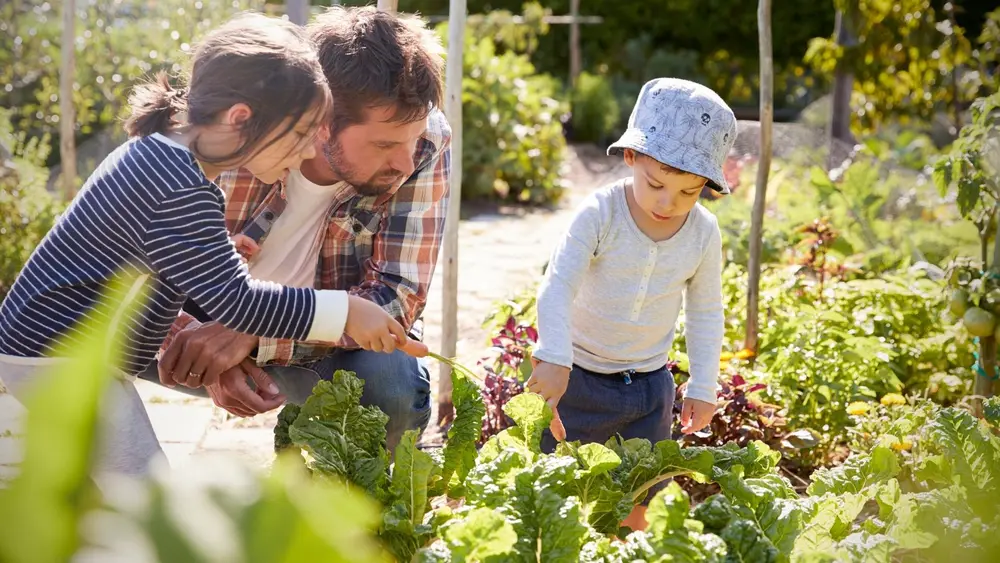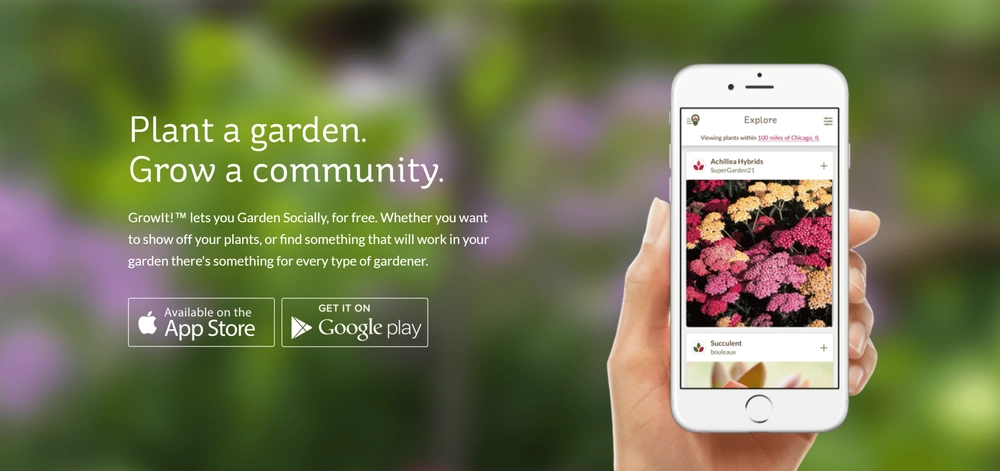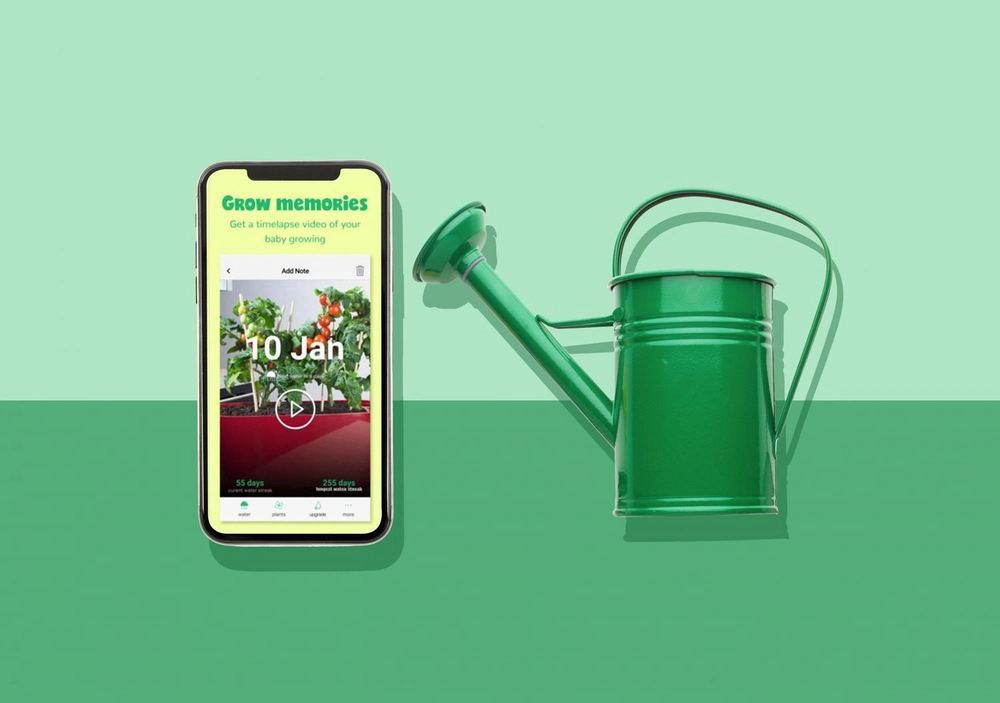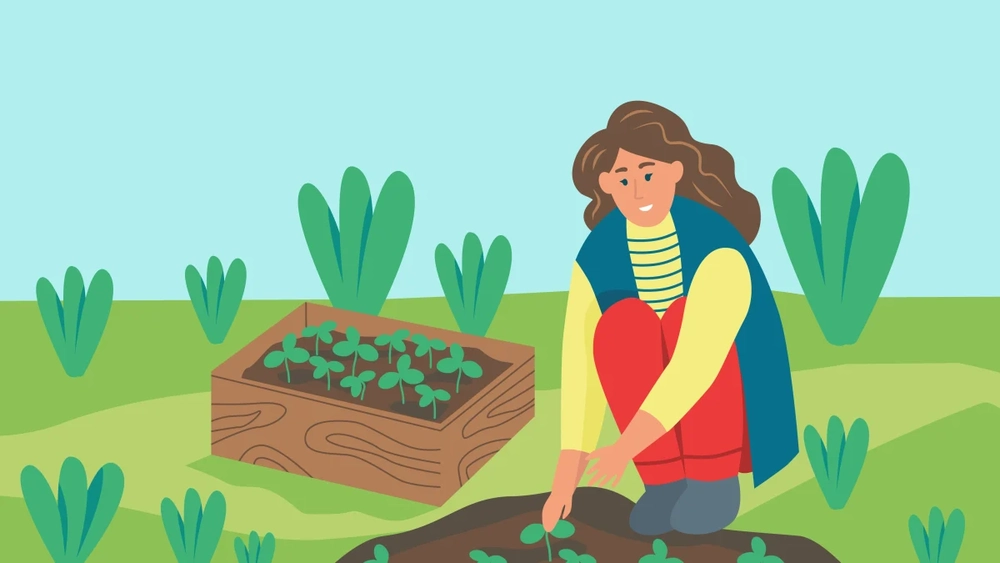
In an increasingly digitized world, technology has infiltrated almost every facet of our lives, including the realm of gardening. No longer confined to the physical tools and traditional practices, gardening enthusiasts now have an entire ecosystem of digital resources accessible via their smartphones. For iOS users, this means a plethora of gardening apps tailored to educate, inspire, and elevate the gardening experience. In this comprehensive article, we will delve into the world of gardening apps for iOS, exploring the top 10 options available. From advanced plant identification to intricate garden planning, these apps cater to gardeners of all levels, transforming the way we engage with and nurture our gardens.

1. PlantSnap: Identify, Learn, and Grow
Compatibility: Requires iOS 11.0 or later
Overview: PlantSnap stands as a testament to the symbiotic relationship between technology and nature. Through the power of artificial intelligence (AI) and image recognition, this app allows users to identify plants simply by taking a photograph. The app then analyzes the image and provides accurate information about the plant, from its scientific name to care requirements.
Features:
- Image Recognition Technology: PlantSnap’s AI technology is capable of identifying thousands of plant species from a single photograph, making plant identification accessible to even the most inexperienced gardener.
- Comprehensive Plant Database: The app’s extensive plant database encompasses a wide range of plants, from common garden favorites to rare botanical specimens. Users can search for plants based on various criteria such as name, family, or habitat.
- Educational Content: In addition to identifying plants, PlantSnap provides detailed information about each species, including care instructions, growth habits, and interesting facts. This educational feature is invaluable for those seeking to expand their botanical knowledge.
Pros:
- Accessible Identification: The app’s user-friendly interface and advanced AI technology make plant identification accessible to everyone, from hobbyists to experts.
- Learning Resource: PlantSnap serves as a digital encyclopedia of plant species, offering a wealth of information that can aid in cultivating and caring for different plants.
- Engagement: Users can connect with a community of fellow gardeners, sharing their plant identifications and learning from one another’s experiences.
Cons:
- Inaccurate Identifications: While PlantSnap’s AI technology is impressive, its accuracy may vary depending on factors such as image quality and the complexity of the plant.
2. GardenTags: Connect with Gardeners Worldwide
Compatibility: Requires iOS 12.0 or later
Overview: GardenTags is more than just an app; it’s a vibrant community of gardening enthusiasts who are eager to connect, share, and learn. It provides a platform for gardeners to document their gardening journeys, seek advice, and celebrate the beauty of their gardens with a global audience.
Features:
- Garden Diary: Users can maintain a digital diary of their gardening activities, capturing photographs of plants, blooms, and garden developments. This feature serves as a visual record of a garden’s evolution.
- Plant Identification: Similar to PlantSnap, GardenTags incorporates AI technology to identify plants based on user-submitted photographs. This facilitates accurate plant labeling and categorization.
- Garden Community: GardenTags nurtures a sense of community by enabling users to interact with fellow gardeners through comments, likes, and shares. Gardeners can also join themed groups and discussions to exchange advice and inspiration.
Pros:
- Community Engagement: GardenTags fosters a sense of camaraderie among gardeners, allowing them to connect with like-minded individuals who share their passion.
- Learning and Inspiration: The app’s community-driven nature promotes knowledge exchange, and users can gain valuable insights into successful gardening practices.
- Visual Documentation: Gardeners can track their garden’s progress over time through photos and notes, reflecting on their achievements and identifying areas for improvement.
Cons:
- Privacy Concerns: Users who prefer a more private gardening experience might feel uncomfortable sharing their garden’s details with a wide audience.
3. My Soil
Compatibility: Requires iOS 9.0 or later
Overview: Soil is the foundation upon which successful gardening rests, and the My Soil app recognizes this fundamental aspect. The app provides users with valuable information about their soil’s composition, pH levels, and nutrient content, aiding them in making informed decisions about plant selection and care.
Features:
- Soil Mapping: My Soil employs location-based data to offer users insights into their soil’s properties. This includes information about soil texture, drainage, and mineral content.
- Plant Recommendations: The app not only analyzes soil data but also recommends suitable plants based on the soil’s characteristics. This ensures that gardeners choose plants that are well-suited to their specific soil type.
- Fertility Assessment: My Soil assesses soil fertility, offering guidance on soil management techniques such as fertilization and composting to enhance its health.
Pros:
- Tailored Plant Selection: My Soil empowers gardeners to make informed decisions about plant selection, promoting the successful growth of plants that thrive in their specific soil conditions.
- Sustainable Practices: By providing insights into soil health and management, the app encourages sustainable gardening practices that optimize soil fertility and reduce environmental impact.
- Scientific Foundation: The app’s data-driven approach draws from scientific research, ensuring that the recommendations and analyses are accurate and reliable.
Cons:
- Limited Scope: My Soil’s focus on soil composition means it offers limited information about other gardening aspects such as plant care and pest management.

4. GrowIt!: Gardening for the Digital Age
Compatibility: Requires iOS 12.0 or later
Overview: GrowIt! presents itself as a social platform tailored to gardeners. It allows users to share their gardening experiences, learn from others, and seek advice from a community of fellow enthusiasts.
Features:
- Photo Sharing: GrowIt! encourages users to share images of their plants and gardens. Other users can then engage with these photos by liking, commenting, and offering insights.
- Plant Database: The app boasts an extensive database of plant species, complete with care instructions, planting tips, and relevant details to assist users in cultivating healthy plants.
- Community Engagement: GrowIt! facilitates interactions among users, encouraging them to ask questions, seek advice, and connect over their shared love of gardening.
Pros:
- Community Building: The app’s social aspect fosters a sense of belonging within the gardening community, where users can learn from each other’s experiences and share valuable insights.
- Visual Inspiration: Gardeners can draw inspiration from others’ gardens, potentially discovering new plant varieties and design ideas that resonate with their personal tastes.
- Plant Knowledge: The app’s comprehensive plant database provides users with a wealth of information about different plants, allowing them to make informed decisions about plant care and cultivation.
Cons:
- Inconsistent Engagement: While the app thrives when the community actively participates, periods of low engagement might result in less valuable interactions.
5. Planta: Your Plant Care Assistant
Compatibility: Requires iOS 12.0 or later
Overview: Planta takes the concept of plant care to the next level by offering personalized assistance and reminders for plant maintenance tasks. With its intuitive interface and user-centric design, Planta caters to both novice and experienced gardeners.
Features:
- Plant Care Calendar: Planta provides users with a digital plant care calendar that outlines essential tasks such as watering, fertilizing, and repotting. The app sends timely reminders to ensure these tasks are not overlooked.
- Customized Care: Users can input specific details about their plants, including species and location, allowing the app to tailor care instructions based on individual needs.
- Troubleshooting: Planta offers solutions to common plant-related problems, equipping gardeners with the knowledge needed to address issues and promote plant health.
Pros:
- Timely Reminders: Planta’s notification system eliminates the risk of forgetting crucial plant care tasks, helping users establish consistent routines.
- Personalized Guidance: The app’s ability to customize care instructions ensures that users receive recommendations that align with their plant’s specific requirements.
- Education and Empowerment: Planta educates users by offering explanations for care tasks and teaching them about the needs of different plant species.
Cons:
- Limited Expertise: While the app offers a range of care instructions, it might not cover all the nuanced care requirements for highly specialized plants.
6. Garden Plan Pro
Compatibility: Requires iOS 12.0 or later
Overview: Garden Plan Pro is a tool designed for garden planning and design, offering a comprehensive solution for individuals seeking to optimize their garden layout. The app allows users to digitally map out their garden space, experiment with plant arrangements, and track their garden’s progress.
Features:
- Digital Garden Planning: Garden Plan Pro enables users to create a virtual representation of their garden space. This includes features such as drag-and-drop plant placement and layout customization.
- Plant Database: The app includes an extensive database of plant species, offering details about plant characteristics, care instructions, and compatibility with specific garden layouts.
- Plant Spacing Guidelines: Garden Plan Pro provides recommendations for plant spacing, ensuring optimal growth and preventing overcrowding within the garden.
Pros:
- Visualization: Garden Plan Pro’s digital planning tools empower users to visualize their garden designs before implementing them, reducing the likelihood of errors.
- Optimized Layouts: The app’s plant spacing guidelines promote efficient use of garden space, ultimately contributing to healthier plants and higher yields.
- Crop Rotation Strategies: By enabling users to track plant locations and arrangements, Garden Plan Pro facilitates effective crop rotation practices that enhance soil health.
Cons:
- Learning Curve: Users might require some time to fully grasp the app’s features and functionality, especially if they are new to digital garden planning.

7. Happy Plant: Keep Your Plants Happy
Compatibility: Requires iOS 12.0 or later
Overview: Happy Plant is designed to simplify the often intricate process of plant care. The app offers comprehensive information about a variety of indoor and outdoor plants, ensuring that users can provide the best possible care for their botanical companions.
Features:
- Plant Care Database: Happy Plant boasts an extensive database of plants, each with detailed care instructions. Users can search for plants based on their preferences and access essential care information.
- Care Reminders: The app sends notifications for essential care tasks such as watering, fertilizing, and repotting. These reminders help users maintain consistent care routines.
- Visual Tracking: Happy Plant allows users to document their plant’s growth over time by capturing photos and adding notes. This visual record provides insights into the plant’s progress.
Pros:
- Comprehensive Care Information: Happy Plant equips users with a wealth of knowledge about various plant species, empowering them to make informed decisions about plant care.
- Visual Progress Tracking: The app’s visual tracking feature enables users to witness their plants’ growth journey and make adjustments based on the plant’s development.
- Indoor and Outdoor Care: Whether users have an indoor garden or an outdoor landscape, Happy Plant offers guidance for a diverse range of plants and environments.
Cons:
- Lack of Specialization: Happy Plant covers a wide array of plant species, but users seeking specialized care information for rare or highly specific plants might find it lacking.
8. SmartPlant: The Gardener’s Personal Assistant
Compatibility: Requires iOS 12.0 or later
Overview: SmartPlant is a dynamic app that combines AI-powered plant identification with the expertise of horticultural professionals. It caters to users seeking accurate plant identification, as well as personalized care recommendations.
Features:
- Plant Identification: SmartPlant employs AI technology to identify plants based on user-submitted photos. The app then offers relevant care advice tailored to the identified plant species.
- Expert Consultations: Users can connect with horticultural experts to receive personalized guidance for plant care, pest management, and troubleshooting.
- Care Instructions: In addition to plant identification, SmartPlant provides comprehensive care instructions that cover watering, sunlight, soil type, and other vital aspects of plant care.
Pros:
- Expertise and AI: SmartPlant offers a hybrid approach, combining the accuracy of AI-powered identification with the nuanced insights of professional horticulturists.
- Personalization: By connecting users with experts, the app ensures that users receive advice and guidance that cater to their specific plant-related challenges.
- Comprehensive Support: SmartPlant’s comprehensive care instructions empower users to make informed decisions and take proactive steps to enhance plant health.
Cons:
- Cost Considerations: While the app offers valuable features, access to expert consultations may involve additional costs beyond the app’s base functionalities.
9. iScape: Visualize Your Outdoor Space
Compatibility: Requires iOS 11.0 or later
Overview: While not exclusively a gardening app, iScape is an invaluable tool for visualizing garden designs and landscaping projects. The app enables users to create a digital representation of their outdoor space and experiment with different design elements.
Features:
- Virtual Landscaping: iScape allows users to virtually create and customize their outdoor spaces. Users can add various elements, such as plants, hardscapes, and architectural features, to visualize their designs.
- Realistic Visualization: The app’s rendering capabilities provide users with a realistic depiction of how their garden design will appear once implemented.
- Design Exploration: iScape encourages users to experiment with different design ideas, layouts, and plant arrangements, facilitating informed decision-making.
Pros:
- Design Visualization: iScape empowers users to see their garden designs come to life before committing to physical changes, minimizing the risk of design regrets.
- Design Flexibility: Users can experiment with various design elements, enabling them to refine their ideas and create a garden layout that aligns with their vision.
- Collaborative Planning: iScape facilitates collaboration by allowing users to share their designs with others, garnering feedback and ideas from friends, family, or professionals.
Cons:
- Limited Plant Information: While iScape excels in design visualization, it might lack the in-depth plant care information offered by specialized gardening apps.

10. Garden Compass: Expert Plant Help
Compatibility: Requires iOS 11.0 or later
Overview: Garden Compass bridges the gap between technology and horticultural expertise, offering users a comprehensive platform for plant identification, pest diagnosis, and expert advice.
Features:
- Plant Identification: Garden Compass utilizes AI technology to identify plants from user-submitted images, enabling accurate plant labeling and facilitating care guidance.
- Pest and Disease Diagnosis: The app provides users with the tools to identify and address common plant pests and diseases, minimizing their impact on plant health.
- Expert Consultations: Users can connect with experienced horticultural professionals to receive personalized advice and recommendations for their gardening challenges.
Pros:
- Comprehensive Problem-Solving: Garden Compass offers a one-stop solution for plant identification, pest management, and expert consultations, empowering users to address various plant-related issues.
- AI and Expertise: The combination of AI-powered identification and access to professional guidance ensures a holistic approach to plant care and problem resolution.
- Tailored Solutions: The app’s personalized advice helps users address specific plant concerns and implement strategies that promote optimal plant health.
Cons:
- Cost Considerations: While the app offers valuable features, accessing expert consultations may require users to incur additional costs.
Conclusion: An Abundant Digital Garden
In the ever-evolving landscape of gardening apps for iOS, this selection of 10 apps represents a diverse range of features and functionalities. From AI-powered plant identification to comprehensive care reminders, social engagement, and design visualization, these apps cater to gardeners of varying skill levels and preferences. As technology continues to integrate with the art of gardening, these apps serve as powerful tools that empower users to cultivate their gardens with confidence, creativity, and precision.
While each app offers unique advantages, it’s important to remember that the heart of gardening remains the physical connection with the soil, the care bestowed upon plants, and the joy of witnessing their growth. The marriage of digital resources with the innate wonder of nature enhances the gardening journey, allowing enthusiasts to embrace both the technological and organic facets of cultivating green havens. As you explore these digital companions, may your gardening endeavors flourish with newfound knowledge, inspiration, and a touch of technological assistance.